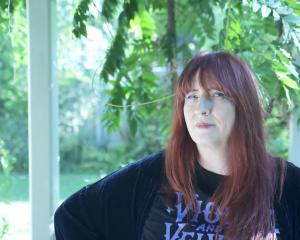Is superannuation an entitlement or a benefit? Fin Heads has taken a case against the attorney-general over "obscene'' legislation that forced him to choose between his superannuation and his dead wife's ACC compensation. The retired Dunedin plumber tells Bruce Munro about his traumatic five-year battle with the Government to win what would be landmark case, and why he believes some in power hope he will die.
Staring intently is one of the things Fin Heads (73) does really well.
He is doing it now. Staring, stony-faced at Ministry of Social Development (MSD) analyst Ananda Domingo.
Mr Domingo, who has worked for the MSD in Wellington for 15 years, is in Dunedin answering questions about evidence he has provided to the Human Rights Review Tribunal considering Mr Heads' claim ACC legislation contravenes basic human rights.
Mr Heads' stare is one of concentration and frustration. During the past five years the retired Dunedin plumber has become a passionate, self-taught authority on ACC and superannuation law and practice as it relates to over-65-year-olds whose loved ones have been killed at work. He is following every question, every response, increasingly irritated by what he perceives to be a muddying of the waters with irrelevant figures and comments.
The cross-examination by Mr Heads' Dunedin lawyer, Dr Fiona McCrimmon, continues, watched by the three-person Human Rights Review Tribunal panel, the defendant's Crown Law Office lawyer, Ian Carter QC, of Wellington, his assistant, a public gallery of about a dozen people and, of course, Mr Heads.
The questions and answers, and the panel's interjections seeking clarification, are restrained, formal, always polite. It is in keeping with this room in the Dunedin Public Art Gallery, a refined space that is all white curtains, ceiling-to-floor glass and a view of the placid greens and yellows of the Octagon's autumnal plane trees. It could not be further from the violent events and visceral responses of the day five years previous that triggered this hearing.
When police came knocking, on the afternoon of April 28, 2008, Mr Heads was sitting on the couch in the living room of the modest 1960s family home he helped build in semirural Abbotsford.
He answered the door and the officers suggested he retake his seat.
''We have to tell you that your wife has been killed in a car accident,'' one of them said.
Shirley Heads (64) was only 37 days shy of retirement on that Monday when she ducked out of work at Dunedin Hospital to run a lunchtime errand. At the intersection of Great King and Hanover Sts she was struck and killed by a turning truck as she crossed the road.
The driver was later convicted of causing death by operating a vehicle carelessly. Mrs Heads' death was deemed a workplace accident.
In shock at the policeman's words, Mr Heads phoned his daughter, who worked for the city council, to tell her the news.
''The next thing, she was screaming,'' Mr Heads said.
''She was the one who had taken the call from the public about an accident at that intersection and had called for the ambulance, not knowing it was for her mother.''
After that ''things went hazy'', he said.
For the next 12 months he was lost in a mental fog.
Three months after his wife's death, Mr Heads was rushed to hospital for heart surgery.
The grief, when it came several months after her death, was like a hammer blow.
''It was unbelievable. I just broke down and bawled my eyes out,'' he said.
Early in 2009, a letter arrived from ACC telling him that he was only entitled to receive both his wife's ACC compensation and his national superannuation for one year. The letter stated he must choose either to receive the ACC payment (48% of what Mrs Heads' average income had been) for the next four years and relinquish his super for that period, or keep receiving the super and give up the compensation. He elected to take the compensation, because it was worth about $40 more per week than the super.
But as the months passed and the veil of shock and grief lifted, he started to ask questions. Both the questions and their answers made him deeply angry.
WHY should he have to choose between his superannuation and his wife's ACC compensation? Hadn't his wife worked and paid not just taxes but also levies to ACC; in essence a compulsory insurance scheme? So why was the Government now refusing to pay out on that insurance? Because, he was told, clause 68 of schedule 1 in the Accident Compensation Act says the superannuitant surviving spouse of a person killed in a workplace accident must, after one year of receiving both their own super and their dead spouse's ACC, elect to receive one or other for the next four years.
But, he countered, if he had been working when his wife was killed would he not have received her ACC compensation even though he would have still been getting his own income?True, but the principle behind the legislation was that you could only have one benefit payment at a time, he was told.
Benefit? I have paid taxes all my working life, since I was 15. Surely superannuation is an entitlement not a benefit, was Mr Heads' incredulous, and increasingly indignant, response.
That's the law, end of story, he was told.
Over my dead body, he thought.
''Just because they set it up in an Act doesn't make it right,'' he said.
''I find it absolutely obscene.''
ANOTHER thing Mr Heads does well is stubborn.
During the next two years he sent dozens of letters and emails to government departments and ministers, including Prime Minister John Key. He sought the help of politicians, advocates and ACC specialists, and spent many hours chasing down and poring over legislation and case law. He had meetings, mediation and reviews, not to mention reviews to determine whether he could have more reviews ...
He found out a lot more about legislation and the inner workings of government than he had ever wanted to know. He discovered, for example, that in 1993 a committee looking at social assistance reforms recommended to the Cabinet ''the requirement that superannuitants elect between superannuation or weekly compensation ... be repealed'' because it could have ''an unintended result''. Cabinet thought otherwise. Clause 68 was not removed.
Every letter and document, hundreds of pages of informal correspondence and incomprehensible legal jargon, were stapled, clipped and filed.
''It's the only way to do it. It's the only way to win,'' he said.
Mr Heads hired a lawyer who thought he had a good case to claim for age-based discrimination: if he had been under 65, he would have received the ACC compensation no questions asked.
In August, 2011, the Human Rights Review Tribunal received a claim under the Human Rights Act, 1993. The claim was lodged in the name of the plaintiff, Ernest Findlay Heads, against the defendant, the Attorney-general.
It was a further 21 months before the hearing convened, in Dunedin, on February 19, 2013. It was presided over by an auspicious three-person panel led by tribunal chairman Rodger Haines QC, of Wellington.
Mr Heads' discrimination case depended on being able to prove two things: that he had been treated differently just because of his age, and that the treatment had caused him ''material disadvantage''.
Mr Carter, representing the Attorney-general, had gathered four witnesses to make the defendant's case; Ministry of Business, Innovation and Employment (MBIE) senior policy adviser Jocelyn Burton, MSD senior policy analyst Alexander McKenzie, ACC senior business analyst Andrew Burton, all of Wellington, and Mr Heads' original ACC case manager, Sandra Smith, of Dunedin.
In essence, Mr Carter would use their testimonies to argue that Mr Heads had not been treated differently and had not been materially disadvantaged. He would also argue that even if discrimination was proven, the age limit was justified because it served an important objective: that of keeping the ACC scheme fair and sustainable.
After the first two and a-half days of the hearing, Mr Carter sought an adjournment. In granting it, chairman Mr Haines also ruled Mr Heads should not have to pay any more costs from the hearing. Further costs should be borne by the Crown, he said. Mr Heads later said his lawyer had trouble getting that bill paid and had to threaten to sue the Governor-General in Mr Heads' name, at which point the account was suddenly settled.
Between mid-February and mid-June the hearing met once every other month for a couple of days at a time.
Mr Domingo was giving his evidence on the first day of the April gathering. He asserted that if surviving spouses were to receive superannuation as well as their dead partner's ACC compensation, it would put extra funding pressure on the New Zealand Superannuation Scheme.
During her cross-examination, Dr McCrimmon repeatedly probed the figures Mr Domingo's forecasts were based on. Which of his tables were actually relevant to Mr Heads' situation? And if Mr Domingo expected allowing superannuitants to keep their super and receive their spouse's ACC compensation would cause a cost increase of $571,000 a year, where did he get the figure of 30 people a year on which he based the calculation?It was a figure given to him by ACC, he said.
But, asked Dr McCrimmon, what about Ms Burton's earlier evidence that the number of superannuitants whose spouses were killed in a work-related accident was more like 21 to 28 a year?And what about the figure Mr Heads had obtained from ACC which said there were 20 people in total in that category during the four years to January, 2013? Or, Mr Heads wanted to ask, what about the figure obtained in 2009 from his ACC case manager that stated there had only been four people in the previous year?As the days of the hearing ticked by, the potential costs of up to $241.1 million a year bandied around early on appeared to be steadily whittled down to perhaps less than $100,000.
Would removing this seemingly discriminatory clause really put either the super or ACC schemes in jeopardy?Mr Heads' answer is an emphatic ''no''. The opposite is actually the case, he says.
His and his wife's superannuities were payments the Government had already factored into its budgets, as they did for everyone else at, or approaching, retirement age. And if Mrs Heads had been badly injured but not killed there would also have been ongoing ACC payments and health expenses the State would have borne.
''Because she was killed, the only possible scenario is that the Government has saved money,'' he says.
At the heart of the case is the question ''Is National Superannuation an entitlement or a discretionary benefit?'' Does the Government have the right to require some people, and not many at that, to make a choice in which surrendering their super for four years is one of the legitimate options?It is a topic Mr Heads would love to debate with the ministers of ACC and MSD as well as the prime minister.
He is particularly keen to discuss it with Mr Key. He has a transcript of a radio interview Mr Key gave in August, 2011, during which he said ''I don't count superannuation as a benefit. I think it's an entitlement. I mean, it's completely universal, paid to anyone aged over 65''.
The Human Rights Review Tribunal is the only body in New Zealand with power to make a ruling that laws are discriminatory.
Win or lose, the case would result in a landmark decision, Dr McCrimmon said during a break in the hearing.
''And if it succeeds, it is a very significant decision,'' she said.
When that decision will be given is unknown. In May, the average age of active cases before the tribunal was 331 days from the day the claim was received.
It is already longer than that since Mr Heads' hearing wound up. And it is close to three years since his claim was lodged with the tribunal.
Asked why the ruling was taking so long and when it could be expected, Ministry of Justice spokesman Matt Torbit said each case had its own complexities and there was no time limit dictating when a decision must be reached.
''It is the nature of courts and tribunals to take a measured and considered approach,'' Mr Torbit said.
MR HEADS is, above all, a forthright man with deeds to match.
He openly admits pursuing this case has cost him a lot. All up, he estimates the loss of superannuation, the legal fees, plus other expenses amounts to more than
$250,000.
''If Shirley and I hadn't been frugal all our life, I would have had to sell the family home,'' he says.
They had been saving for what was meant to be their golden years. Those funds, along with their super, were to have enabled renovations to the house and travel in New Zealand and overseas, including regular trips to visit grandchildren in Australia.
With Shirley's death, if he had received the ACC compensation and his super for five years he would at least have been able to finish doing up the house, sell it and move on with his life, he says.
The irony of the law as it stands is that he would be better off if, a year after his wife was killed, he had committed a crime that sent him to prison for four years. He would have lost his super for the time he was in jail, but would have received Mrs Heads' ACC compensation, he said.
''And I could have rented the house out, while they [the State] took care of my health, my meals, my clothing, my heating ... And at my age I wouldn't have worried about a criminal conviction.''
All the rebuffs, obstacles and delays Mr Heads has faced have convinced him he is viewed as a problem which some in power wish would go away.
''It's my firm belief [they] work on the principle that for people my age if they hold out for long enough, with a bit of luck they'll die.''
They are unlikely to get their wish.
His hope is that a tribunal ruling in his favour will mean ''justice will prevail and the wrong will be righted''.
''In particular, that the Government will feel morally obliged to recompense those like me who are still surviving. And those who aren't surviving, that their beneficiaries will be recompensed.''
But if the ruling does not go his way, that is not the end of it for Mr Heads.
''I think I would appeal. But without a lawyer, because I'd no longer be able to afford one.''
That is stubborn for you. And there is no doubting he means it. He has that look in his eye.












